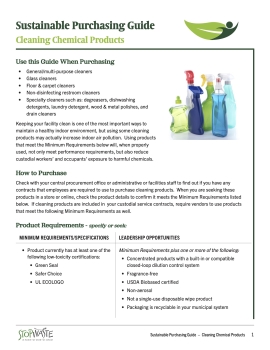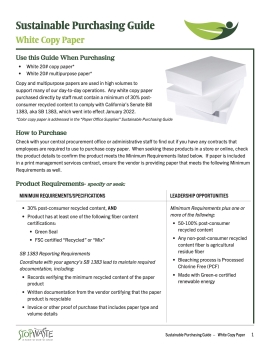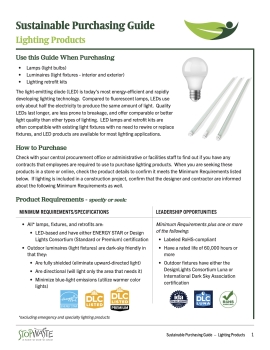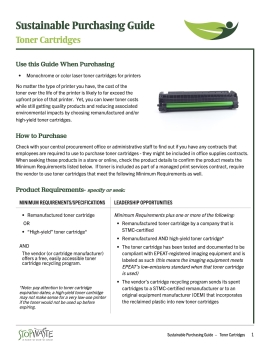Sustainable Purchasing Guides
Guides and resources that can help reduce the environmental impact of your organization’s purchasing choices.
The following Sustainable Purchasing Guides (SPGs) were designed to provide specific policy-driven product and service direction for more sustainable purchasing in a 2-page format that agency leads can use as a communication tool to agency staff who make purchasing decisions. Each Sustainable Purchasing Guide contains:
- Product or service description
- “How to Purchase” direction
- Minimum Requirements (as referenced in policy template) – these are the specific mandatory requirements for the particular good or service
- Leadership Opportunities (as referenced in policy template) – these are optional opportunities to “push the envelope” in terms of the sustainability criteria for the particular good or service
- Ecolabel references (as applicable)
- Related Tips – these vary by product or service category, but relate to planning, usage, and/or disposal tips.
- Benefits – Key benefits associated with the Minimum Requirements and/or Leadership Opportunities. These can be tied back to the Core Strategies referenced in the policy template.
- Related Links – Guides may also contain links to additional resources, certified product registries, and/or more details on a particular topic within the Guide.
Other reputable guidance documents are also included on this page to aid sustainable purchasing programming when they address topics not covered by existing SPGs.

Keeping your facility clean is one of the most important ways to maintain a healthy indoor environment, but using some cleaning products may actually increase indoor air pollution. Using products that meet the Minimum Requirements below will, when properly used, not only meet performance requirements, but also reduce custodial workers’ and occupants’ exposure to harmful chemicals.

Janitorial paper products are single-use items primarily used in facility restrooms and break rooms. They may be purchased as stand-alone items or included in a custodial services contract. Any janitorial paper products purchased directly by staff must contain a minimum of 30% post-consumer recycled content to comply with California’s Senate Bill 1383, aka SB 1383, which went into effect January 2022.

Although all “antimicrobial” products have risks, many conventional disinfectants, such as chlorine bleach, pose more serious risks to custodial workers and building occupants because they contain active ingredients that have been found to cause asthma, cancer, skin sensitization, or other health hazards. Yet, surface disinfectants with more benign health and environmental impacts than conventional disinfectants are readily available, cost effective, and have equivalent or greater efficacy in killing bacteria, viruses, and fungi.

Electronics are key feature of most workplaces today. Consequently, purchasing more sustainable electronics represents a significant opportunity to further an agency’s sustainability goals - whether focused on energy consumption, toxics reduction, human/worker rights, and/or waste reduction.

Copy and multipurpose papers are used in high volumes to support many of our day-to-day operations. Any white copy paper purchased directly by staff must contain a minimum of 30% post- consumer recycled content to comply with California’s Senate Bill 1383, aka SB 1383, which went into effect January 2022.

Office electronics such as printers and copiers continue to be a mainstay for most offices. Consequently, purchasing more sustainable electronics represents a significant opportunity to further an agency’s sustainability goals - whether focused on energy consumption, toxics reduction, and/or waste reduction.

Furniture can contain a lot of hidden toxic chemicals that can either off-gas or rub off products over time, affecting human health. The Minimum Requirements in this guide focus on reducing exposures to harmful chemicals, among other beneficial attributes.

The light-emitting diode (LED) is today’s most energy-efficient and rapidly developing lighting technology. Compared to fluorescent lamps, LEDs use only about half the electricity to produce the same amount of light. Quality LEDs last longer, are less prone to breakage, and offer comparable or better light quality than other types of lighting.

Paper fiber is a common material for many office supplies - from sticky notes to storage boxes. Paper office supplies purchased directly by staff must contain a minimum of 30% post- consumer recycled content when equal in cost and function to comply with California’s Senate Bill 1383, aka SB 1383, which went into effect January 2022.

Print services are often used for high-volume print jobs, mailers, and specialty printing. If your agency directly uses the resulting print job materials, the paper used for the print job must contain a minimum of 30% post-consumer recycled content to comply with California’s Senate Bill 1383, aka. SB 1383, which went into effect January 2022.

Servers are the backbone of our networks and online applications. Data centers are also some of the most energy intensive buildings to operate, consuming 10 to 50 times the energy per floor space of a typical commercial office building. Data centers are also water intensive - among the top-ten water-consuming industrial or commercial industries in the U.S. While smart data center design is key to reducing impacts, the server equipment itself plays a significant role in reducing both energy and cooling loads within data centers.

No matter the type of printer you have, the cost of the toner over the life of the printer is likely to far exceed the upfront price of that printer. Yet, you can lower toner costs while still getting quality products and reducing associated environmental impacts by choosing remanufactured and/or high-yield toner cartridges.

While food service ware may not be the first thing you think of when planning an event, being thoughtful about how food and beverages are served can support reducing waste and exposure to toxic chemicals, among other sustainability goals. As part of your planning, first assess whether reusables are available and practical for the application. If disposables are necessary, be sure to also check with your hauler/composter/facility ahead of time regarding what types of items they accept.